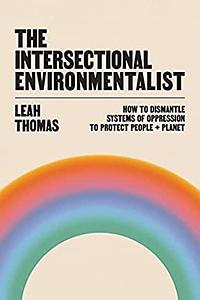Take a photo of a barcode or cover
569 reviews for:
The Intersectional Environmentalist: How to Dismantle Systems of Oppression to Protect People + Planet
Leah Thomas
569 reviews for:
The Intersectional Environmentalist: How to Dismantle Systems of Oppression to Protect People + Planet
Leah Thomas
informative
inspiring
fast-paced
challenging
hopeful
informative
medium-paced
challenging
informative
inspiring
fast-paced
AMAZING BOOK!!! for me it was hard to read but thats just because i am not used to non fiction. i have a larger view of intersectional environmentalism and will choose to fight for inclusivity. thank you leah thomas!
informative
inspiring
slow-paced
Moderate: Racism
informative
fast-paced
Thanks to NetGalley and the publisher for an advanced copy in exchange for an honest review.
I really love the concept of intersectional environmentalism to address issues facing marginalized groups with climate change. I think it is a necessary focus and I also was introduced to the author's social media material prior to reading this book, and liked it.
However, I did have higher and very different expectations of this book. This book's intended audience I think was meant to be people who have absolutely zero knowledge of any social justice terminology, as by far most of the book is spent explaining what terms like "privilege" and "intersectional" mean. Don't get me wrong, they are great explanations, but again only really useful if you are very new to this topic. I am not sure how easily readers who ARE new to this topic would seek out this book, however.
I expected a lot more information on environmental issues specifically, but the few given were quickly summarized. I did like that the author included a lot of reference material for further reading, and listed many individuals who are doing work in this space as well.
Overall, the format and content of this book are meant for a very specific audience that is not myself, and so I did not gain much from reading it, though it would be a good introduction for a complete beginner to this topic.
I really love the concept of intersectional environmentalism to address issues facing marginalized groups with climate change. I think it is a necessary focus and I also was introduced to the author's social media material prior to reading this book, and liked it.
However, I did have higher and very different expectations of this book. This book's intended audience I think was meant to be people who have absolutely zero knowledge of any social justice terminology, as by far most of the book is spent explaining what terms like "privilege" and "intersectional" mean. Don't get me wrong, they are great explanations, but again only really useful if you are very new to this topic. I am not sure how easily readers who ARE new to this topic would seek out this book, however.
I expected a lot more information on environmental issues specifically, but the few given were quickly summarized. I did like that the author included a lot of reference material for further reading, and listed many individuals who are doing work in this space as well.
Overall, the format and content of this book are meant for a very specific audience that is not myself, and so I did not gain much from reading it, though it would be a good introduction for a complete beginner to this topic.
informative
slow-paced
hopeful
inspiring
fast-paced
Some scattered thoughts: This book has a bit of an identity problem. It doesn’t know who its target audience is. Some sentences are understandable to a 10-year old, while others use jargon only a college-level humanities student would know. As someone who works in climate sciences and has studied environmental justice, I didn’t really learn much from this book, but that’s sort of what I expected going in, so I’m fine with it. But I do wonder how educational it really is even for those who don’t actually know much about the topics presented. The author gives only a very surface level look into the issues of environmental justice, etc. Frustratingly, she occasionally alludes to capitalism being one of multiple factors contributing to certain environmental and racial injustices, and yet never explains why or how capitalism is at fault. This is unfortunate, since capitalism is an absolutely essential concept to understand when it comes to discussions of climate change and environmental justice. I think it does the movement disservice to ignore this. The book also seems a bit pieced together/disjointed, like the author wasn’t really sure what the main purpose of this book was supposed to be. I’m not even sure she effectively makes the case for why “intersectional environmentalism” is a necessary new term, fully separate from the established fields of environmental/climate justice, but if this sort of rebrand (and it’s aesthetically pleasing infographics) are what get young people engaged with these topics, then I think it’s a good thing. All in all, not a particularly groundbreaking book, but I suppose it would be valuable for teenagers or certain young adults who are looking for a very basic introduction to the topic (though they might want to skip some of the word-salad quotes from the author’s friends).
informative
medium-paced






